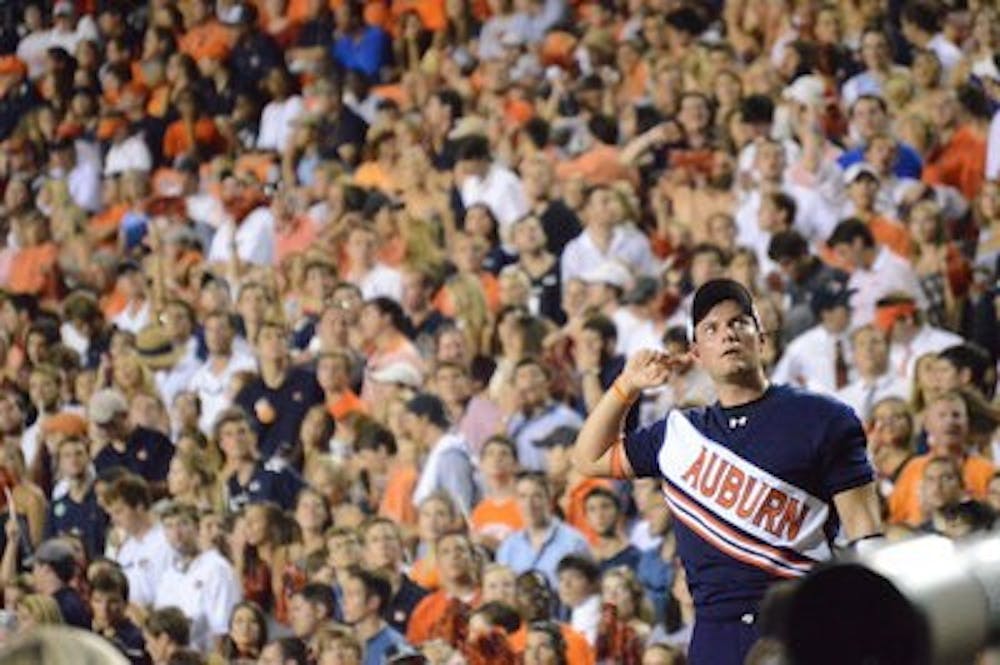The Student Government Association joined with the Organizational Seating Program to bring another major change to Auburn campus operations.
SGA has changed the way organizations compete for block seating during football season.
The system, which prior to the change, was based on the amount of Ignited points an organization earned will now concentrate on the organization's overall average GPAs.
"Grades from previous semesters are not considered, so each organization begins the year with a blank slate," said Colson Smith, executive vice president of programs.
The organizational average GPA earned in the fall 2014 semester and the spring 2015 semester is the only factor for next year's football season seating.
The organizations that earn the highest average GPA will be rewarded with seats in the block seating section; a game day tradition that Smith said is disappearing across the SEC.
"The reason we made these changes is because at other SEC schools the block seating is a thing of the past," Smith said. "It's kind of died out and that's been in large part because they didn't have a good reason to allocate it, and it was one of the problems. So we're taking proactive steps that we think need to be made for us to have the block in the future."
According to members of SGA, the mission of the SGA Organizational Seating Program is to fairly and efficiently allocate reserved seating as a reward to organizations whose members demonstrate academic excellence.
Logan Powell, SGA president, said he believes this system is better for the Auburn Family because it promotes academic success in a place where it is the main focus of going to school.
"The big question we faced was: how do you take away that burden of going to events and just reward students for being students?" Powell said. "Obviously, GPA is the universal factor for all students. Every student at Auburn earns grades and so that's how we leveled the playing field for everybody."
Powell said the system used last year that included Ignited points had many shortcomings, which ultimately led to the decision to change the credentials for block seating.
Some of the issues with the Ignited points system were the burden it put on participants, the fandom it created and enforcement problems because people would leave early.
"There would be 500 people walking out during the national anthem and it was very bad as far as how it made students look and how it made the athletes perceive the student body and their interests in sports," Smith said.
According to Powell and Smith, the Ignited points system was greatly affected by organizations' size.
More people from an organization who attend an Ignited event meant more points for that organization.
Powell said smaller organizations competing for block seating were at a disadvantage from the beginning of the semester.
Now, with the GPA system in place, Powell said the size of the University organization has no bearing on an organization's ability to receive block seating in the stadium.
Thomas Bucker, sophomore in business, said he agrees with the new system since it offers an extra incentive.
"I never really liked having to go to sporting events I didn't care about," Buckner said. "Now, with the GPA system, it will keep everyone focused on their schoolwork."
The Ignited points reward system still exists through Auburn Athletics to give individual rewards for attending events where Ignited points are rewarded, but will no longer determine organizational block seating in Jordan-Hare Stadium.
Powell said the rules for block seating will be the same as they have in the previous years.
This includes the rule an organizations section must be filled an hour prior to kickoff, or else the section will be opened to students trying to find seats.
"From top to bottom, we thought it was a better program for students because it's asking them to do, what they are here to do and that's make exceptional grades and go on to have great careers because of the educational experience they had here at Auburn," Powell said.
Do you like this story? The Plainsman doesn't accept money from tuition or student fees, and we don't charge a subscription fee. But you can donate to support The Plainsman.





